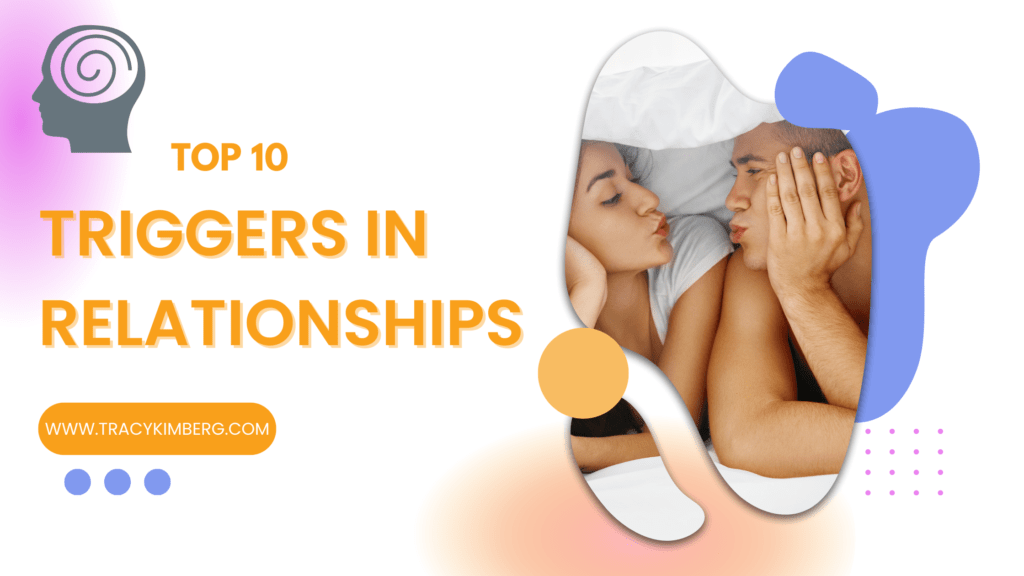In relationships, we feel emotionally reactive or triggered by something our partner does or says. Emotional triggers can develop from our insecurities or when someone hurt us in the past. It can be a problem when we react emotionally instead of staying calm and communicating exactly why we are feeling triggered. Here are the Top ten triggers in relationships:
When someone reacts emotionally to something we say or do, we can instinctively become defensive. Defensive behaviour is one of the Four Horseman in relationships. According to Dr. John Gottman, this behaviour will destroy your relationship in the long run. As a result, you will find specific unhealthy behaviours start increasing, such as:
- Defensive arguments
- Stonewalling
- Sometimes, a couple has triggers that trigger each other. Trigging each other can cause exceedingly painful situations and make them feel hopeless about their relationship.
Depending on your combination of past baggage and present worries, there is quite a variation of potholes we can hit in relationships. However, no matter what comes up as a trigger for you or your partner, working on this together with patience and understanding, it is possible to find a solution to overcome this problem. Ignoring and pretending it doesn’t affect you or your partner will not help your relationship. Most people have triggers. Accepting this and discussing your triggers with your partner can increase your feeling of safety within your relationship. Here are ten typical relationship triggers I have dealt with and a suggestion on how to manage them:
- Past trauma: Unresolved past trauma can often resurface in relationships. Explaining where your trigger comes from to your partner can help them avoid certain triggering behaviours.
- Anxiety about the future: Unnecessary worrying about the future can be a problem in many relationships. Stay present, enjoying the moment, practicing meditation, Yoga, or spending time together in nature can help your mind quiet down.
- Trust: When your partner has trust issues talk to them about how this came about. Open communication and honesty about what triggers doubts and setting clear boundaries can help partners understand how to build trust. Controlling behaviour is never a healthy way to ensure trust.
- Past relationships: Past relationship partners with specific behaviours and traumatic memories linked to behaviours can cause emotional triggers. It is helpful to communicate this to your partner. Understanding your triggers can help you process them. Remind yourself when you feel triggered. “Different time. Different place, Different person.”
- Dealings with ex-partners: Being open and honest about dealings with previous partners can help avoid your partner feeling excluded. Working as a team can help prevent conflict.
- Insecurities: Be open about each other’s insecurities to avoid unnecessarily doing this that could distress your partner, except that we all have flaws and that we should not have unrealistic expectations of ourselves in the relationship, as well as unrealistic expectations of our partner.
- Emotional withdrawal: This can also be stonewalling behaviour. Shutting down physically or emotionally is a coping mechanism often present when someone is triggered. Understanding this flight or flight response and working through it together will prevent your assumptions about how your partner is feeling or what they are thinking.
- Timekeeping: Be clear on what you need from one another regarding timekeeping.
- Unreliability: When people present unpredictable behaviour, it can destroy trust. Set clear boundaries and expectations. Realistic expectations can prevent problems when it comes to reliability.
- Going on holiday:
- Discuss expectations for the holiday when planning.
- Allow for compromising when you disagree on details.
- Be clear on budgeting and spending capabilities.
When these triggers go unaddressed, your go-to behaviour is reactive. On the flip side, if your partner is triggered and you are unwilling to understand that your behaviour might be causing the trigger response, it will build resentment and eventually start eroding your relationship. Finding the help and support you need in these difficult situations, can often help you resolve your unknowingly damaging behaviours. A relationship expert can help you do this.
Read more on what makes relationships work here.

